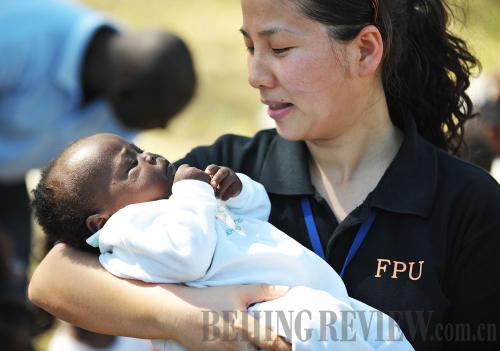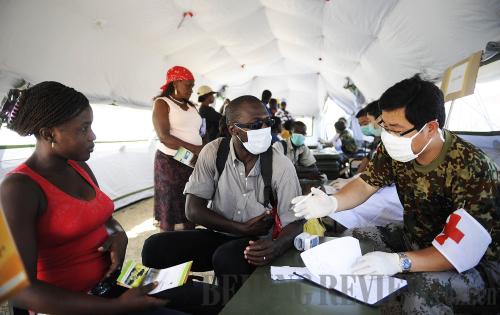|
 |
|
THE HANDS OF A CRADLE: A member of the Chinese anti-riot peacekeeping police team in Haiti cares for an injured Haitian baby at an orphanage in Port-au-Prince on January 30 (WU XIAOLING) |
On May 12, 2008, one of the biggest earthquakes in modern Chinese history leveled much of Sichuan, claimed some 70,000 lives, injured more than 300,000 people and left 5 million homeless.
Though an unmitigated disaster, it also proved a rallying cry: The Chinese Government immediately pledged 1 trillion yuan ($146.5 billion) in assistance and, before a national mourning was even declared, a massive recovery effort got fully underway.
Just over 20 months later, a devastating earthquake jolted Haiti, claimed more than 200,000 lives and brought the already impoverished Caribbean nation to its knees. Now, the long suffering country, barely able to self-govern at the best of times, is all but at the mercy of international humanitarian aid.
To this end, many analysts believe the international community that has since scrambled to Haiti's cause can learn much from China. Moreover, they say, Beijing's rapid response, restoration of services and reconstruction for the people of Sichuan is a template for success amid the rubble.
 |
|
DIAGNOSES AMID DEVASTATION: A Chinese doctor treats Haitian patients at a shelter for earthquake victims in Port-au-Prince on February 1 (WU XIAOLING) | Indeed, in many ways, despite the immense devastation the 8.0-magitude Sichuan quake—with Wenchuan as its epicenter—left behind, affected regions have since begun to take on a new look, one of rebuilt homes and businesses from the ground up, that is.
This was no accident. "China's experience in addressing the aftermath of the Wenchuan earthquake—offering accessible medical services, preventing infectious diseases in earthquake-hit areas and ensuring efficient logistical support—is applicable to Haiti," said Wu Hongying, Director of the Division of Latin American Studies at the China Institutes of Contemporary International Relations.
Pressing tasks
But before reconstruction can begin, meeting the basic needs of earthquake survivors while maintaining law and order, Wu said, remain the biggest priorities.
Since the earthquake shattered Haiti's already faltering government, with its presidential palace destroyed and many of its senior officials dead, she said, the functioning government in Port-au-Prince needs to rebuild its administrative system as fast as possible to coordinate aid services.
The international community, working alongside the Haitian Government, needs to attend to rebuilding transportation infrastructure, such as roads, and air and seaports in Port-au-Prince, in short order so international aid can be delivered in a timely fashion.
Shelter is also critical for hundreds of thousands of homeless people, while efforts should be made to prevent outbreaks of infectious diseases—two things that she believes must be addressed by the Haitian Government and the international community.
In addition, Wu said, international disaster relief missions should work with each other effectively. Coordination between the UN, which oversees peacekeeping operations in Haiti, and the United States, a major provider of assistance, should in particular be enhanced.
Between the moments when the 7.3-magnitude earthquake practically leveled many of Haiti's most populated areas on January 12 and early February, 67 international rescue teams were working around the clock in Haiti, according to the UN.
Continued support
China, of course, has risen to the occasion, too. In all, Beijing has provided 48 million yuan ($7.1 million) in materials and medical services, as well as $3.6 million in cash to Haiti, according to the Chinese Foreign Ministry.
A second shipment of Chinese goods arrived at the Port-au-Prince Airport on January 26. The 65 tons of supplies included portable power generators, water purification devices, tents, clothes and medicine. The third shipment, consisting of 25 tons of medical aid, reached Haiti on February 8.
A 40-member medical and epidemic-prevention team, meanwhile, was dispatched to Haiti. Their deployment was meant to relieve a Chinese search and rescue team, which had been operating in Haiti since January 14 and was one of the very first international rescue teams to arrive in Port-au-Prince after the earthquake.
Each of the Chinese doctors on the team had participated in the rescue mission in the wake of the Wenchuan earthquake. During their two-week stay in Haiti from January 25 to February 8, they treated about 4,000 Haitian patients, while training volunteers in preparing drugs and conducting sterilization.
As a part of the training, the volunteers were schooled in methods to control the spread of epidemics on their own after Chinese doctors' departure, Yang Zhengzhou, an epidemic specialist on the team, told Xinhua News Agency.
In addition to medical workers, China has deployed four more peacekeeping police officers to Haiti. Among the eight Chinese police officers killed in the earthquake, four were members of the Chinese peacekeeping police force in Haiti.
Apart from maintaining public security, Chinese peacekeeping police officers play a critical role in rescue and relief operations, said Edmond Mulet, the interim head of the UN Stabilization Mission in Haiti, in an interview with Xinhua News Agency.
"My impression of the Chinese peacekeepers is that they are a professional, highly efficient, fast-responding and multi-functioning team," he said. They are, he said, "an important force" to maintain the situation in Haiti and especially in Port-au-Prince.
China, as a permanent member of the UN Security Council, "was the first to propose increasing the capacity of the UN in Haiti's reconstruction," he said, noting that he believes the move demonstrated China's political support for the world body.
This was underscored by the fact that, on January 19, the UN Security Council adopted a resolution under which it would send an additional 3,500 peacekeepers—including 1,500 police officers and 2,000 military personnel—to Haiti.
|
